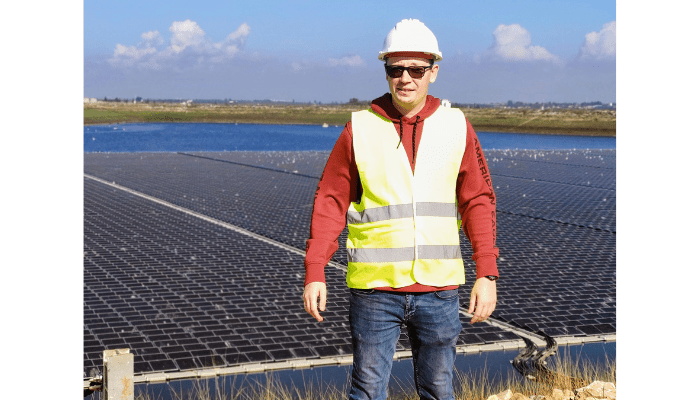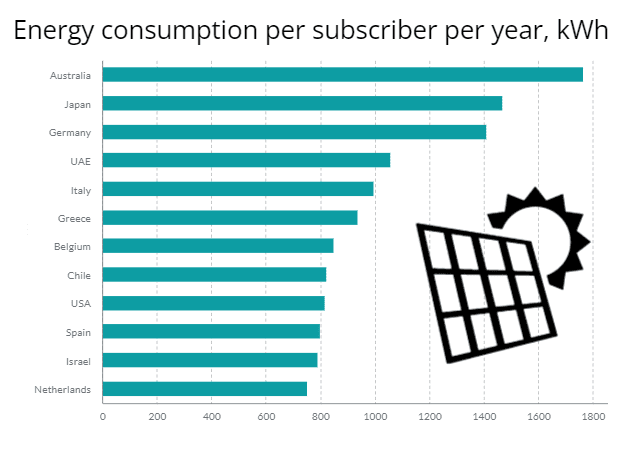The principles of the Fourth Industrial Revolution were formulated in Germany in 2011. Its basic postulate was cybernetic systems mainstreaming in all spheres of industry, and production, as well as in the field of universal human needs: everyday routine, services, leisure, etc. Of course, global digitalization could not help but affect the field of solar energy, as one of the most actively developing in many countries of the world.
Some statistics: the share of solar energy consumption in different countries
The consumption of solar energy per person p.a. is probably the most adequate indicator since it does not take into account the total population and geographical area of a particular state (it is clear that in raw numbers China or the United States produce much more energy than, for example, Israel).
With regard to individual consumption of solar energy per user, the twelve leading countries looked like this, based on the data for 2020:
These figures demonstrate not only the direct dependence of production on the number of sunny days per year (it is difficult to compete with Australia, the UAE or Israel), but also show that the higher the overall level of technological development of the state is, the more attention it pays to the development of the renewable energy sector.
In the global conception, the importance of renewable energy recovery is confirmed by the total share of green energy in the world – at the end of 2021 it exceeded 10% of the total worldwide, and in countries such as Spain, Portugal, and Germany, it was higher or at the level of 30%.
How technology and energy are connected
The production, distribution, delivery of energy to consumers, organization of uninterrupted processes in energy systems and even digital security in the operation of such systems are the merit of the tools and solutions of the fourth industrial revolution.
Until the fifties of the last century, industrial processes were managed by people manually – there was a person with his/her own degree of responsibility behind each operation. Everything began to change rapidly in the seventies with the advent of a PLC (programmable logic controller), when some of the parameters, their control and management were assigned to the device and thereby the human factor was eliminated at least partially.
With the development of the Industrial Revolution 4.0, the control and management of many processes, including in the energy sector, have reached their peak. Largely thanks to the systems of main control data collection and management or SCADA (Supervisory Control And Data Acquisition).
SCADA is a single software platform that manages enterprise processes, collects statistics, archives the data obtained for subsequent analysis and increases the efficiency of processes and the work of the subordinate object as a whole.
SCADA and energy efficiency
Each element in the SCADA system, whether it is a sensor, pump, valve, generator, etc., is equipped with a sensor that allows you to collect data in real time and archive it.
The collection and processing of such information is necessary for the subsequent analysis, evaluation and increase of the efficiency of processes in the most complex systems, including in the field of alternative energy.
The second important aspect of SCADA application is cybersecurity. Today, cyberattacks on energy facilities are not uncommon and the prevention of such attacks using programming methods is an extremely important issue:
- segmentation and decentralization of the network;
- encryption of control system elements;
- continuous monitoring of processes and indicators;
- implementation of protocols against incidents of various types.
Such tools of the fourth industrial revolution, such as machine learning and cloud computing – artificial intelligence methods – allow to automate the processes of countering cyber attacks.
And what about the human factor
Specialists who create algorithms for the interaction of thousands of elements in the power grid, program controllers and develop necessary software play a huge role in the implementation of such systems. The final result and operational stability of energy facilities – solar power plants, power lines, transformer substations, etc. – depends specifically on them.
If we take into consideration how rapidly green energy (and not only) is developing today, it is not difficult to come to the conclusion that the demand for such specialists will only grow along with the degree of digitization and automation of the industrial and energy sectors and thereby contribute to the development of the economies of countries around the world.
This trend becomes especially obvious in Israel, which, without its own oil or gas reserves, receives a significant part of its electricity thanks to solar power plants and their competent management. The United States is not far behind Israel – despite the general energy independence, a green energy development program has been operating in the country for more than a decade.
Alongside the rapid growth of electric vehicles’ proportion (motor transport has always been one of the main determining factors of the American economy) this allows it to be confident in the stable development of green energy and tools to control and monitor processes within this sphere.
About the author
Andrey Makeev is a project manager in the field of solar energy. He has extensive experience in the development of control systems in industry and energy. Currently he is engaged in the development of solar energy management systems in Israel. In particular, the development of web interfaces for monitoring systems, as well as the development of control programs for controllers.
Author: Andrey Makeev
































